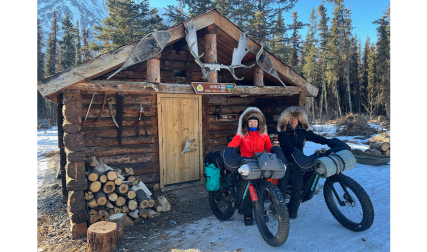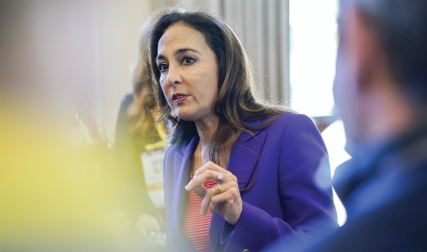The Humanities
Kudos to Judith Hertog for her outstanding article [“Why We Need the Humanities,” March/April] on such a vital and complex subject. She quoted several academics, but only professor emeritus Edward Bradley spoke to the ultimate purpose of humanities study: “to consider who we are, how we are and what is the meaning of our being.”
Nesanel Kasnett ’67
Brooklyn, New York
As an undergraduate chemistry major, and now as a psychiatrist, I cannot agree more with the importance of a humanistic education, even for those students who, like me, majored in areas targeting an obvious career path. With no disrespect to the wonderful chemistry teachers I had in the old Steele Hall, the courses I have found most relevant over the intervening years are those I took in the history department. Those courses and the papers I had to write for them most inform my understanding of the world in which we now find ourselves. Thus, a humanistic education remains important, in no small part because many Americans apparently have failed to learn their history lessons.
Erik Roskes ’86
Baltimore
The cover story of the last issue speaks to me deeply. I am in Georgetown’s M.A.L.S. program, and have found it my little boat in the ocean of crazy this past year. From theology to the classics to my current course in Russian history and culture through literature and film, studying the humanities has never felt more relevant.
I was a Russian language and visual studies major. My 17 or so years home with our four kids, drawing a modest income the second half of those years as a part-time freelance writer and teacher, would mean my return on investment in my Dartmouth education was pretty poor by today’s standards—based on earnings potential. I so deeply resent that metric even though it is tossed around among friends who, like myself, are parents of college-age students.
Thanks for putting this issue on the cover.
Jane Varner Malhotra ’90
Washington, D.C.
Left unsaid in the statistics about a decline in humanities majors and students’ narrow definition of success is how much Dartmouth itself is at fault for this dismaying trend of decreasing interest in humanities. During five or so years as an alumnus admissions interviewer, I became increasingly discouraged by the nature (not quality) of the students accepted—or not accepted. Most of the accepted students seemed the most “success-oriented” of each cohort and, perhaps not coincidentally, often the least interesting. One of the more prominent statistics Dartmouth trumpets each year when it describes who was accepted into the College is the number of high school valedictorians, a class of student hardly known for its willingness to challenge the system.
Early in President Hanlon’s tenure he met with alumni groups to present his vision of how Dartmouth would produce creative and critical thinkers. There were plenty of students in lab coats or working on computer laptops in photographs he showed but not one picture of students in the arts or any mention of how the arts fit into the College’s plans.
If one accepts primarily students who (or whose parents) believe that “American success” is best attained through practical studies directed toward corporate achievement, you’re not going to see an increase in humanities majors. Surely in the 20,000-plus applications to Dartmouth the College can manage to identify more humanities-oriented creative thinkers beyond the usual suspects of valedictorians, legacies and football captains. Maybe in order to get more humanities majors—our future critical and creative thinkers—Dartmouth will need to do a little thinking outside the box.
Kennon Rothchild III ’77
Upper Nyack, New York
Your premise is correct: We need the humanities. Right now. More than ever.Within days of your article’s publication, the Trump administration’s proposed budget called for the elimination of the National Endowment for the Humanities (NEH), National Endowment for the Arts (NEA) and Corporation for Public Broadcasting (CPB).
To those who say that the federal government shouldn’t be funding such things, I would say that our nation has a vested interest in its citizens being engaged with the humanities. That’s how we learn important stories that together form our history, the values and principles upon which our nation was founded, and the ideals and aspirations that we need to continue to pursue in the task of forming a more perfect union. If you don’t know your past, you literally don’t know who you are.
NEH-supported films by Ken Burns, traveling museum exhibits and other projects funded by NEH grants make a huge difference. And humanities councils in every state and territory, including the Vermont and New Hampshire humanities councils, bring the humanities to thousands of communities large and small—to schools, libraries, museums, correctional facilities, childcare centers, adult basic education centers, veterans organizations and elsewhere.
Nations destroy themselves more often than they are conquered. At a time when our society is becoming less civil and we don’t know our fellow citizens or ourselves as well as we should, we need to be reading, participating in civil conversations with others and continuing to learn throughout life. I urge readers to make this case to their congressional delegations. We need the NEH, NEA and CPB more than ever.
Peter Gilbert ’76
Montpelier, Vermont
Let’s not forget the emphasis that President John Sloan Dickey ’29 put on “the liberating arts,” a.k.a. the humanities—for which I am most thankful.
Herb Knight ’51, Tu’52
St. Charles, Illinois
I believe that by making a distinction between the humanities and the sciences we not only miss the opportunity to communicate to students that the humanities teach us “who we are, how we are and what is the meaning of our being,” but we also drive an unnecessary wedge between the liberal arts and the sciences.
At the class of 1966 50th reunion I participated in a panel discussion focused on the “value of the humanities” and discussed what made me a better and different kind of engineer: I earned a bachelor of arts with an engineering major. You don’t have to earn a degree in the humanities to gain the wisdom acquired by studying the humanities as an integral part of any educational journey, even if studying science or engineering.
I believe that Dartmouth gave me a more fundamental engineering education than my buddies in my University of Michigan Ph.D. program received, and this allowed me to both make a better than average living and to make contributions to our human institutions. I attribute my success and satisfaction through a long career to my liberal arts education at Dartmouth, and my challenge to both the scientific and the liberal arts worlds is to integrate the humanities with science, starting in kindergarten, through the entire educational process. Just as one writing course cannot teach a person to write, we should understand that an educated person must have a fundamental and integrated knowledge of both the humanities and technology that can be achieved only during a lifetime of education.
Tom Brady ’66, Th’68
Holland, Ohio
So the fact that Trump won the election is a sign that the humanities are either in decline or the electorate needs more humanities education. Do you mean indoctrination? I was an English major, and I teach humanities and English at the college level. Unfortunately, I don’t think “Western Civilization” has got to go, nor have I taken a course in queer studies or literary criticism. The author and the supporters of this article’s point of view need to get out of their bubble. If that’s a “micro-aggression,” I’m sorry. Go to a safe space and recover.
Ned Cummings ’68
Virginia Beach, Virginia
Arts are the new STEM:
S tudio Art
T heater
E nglish
M usic
Jeffrey Ruoff
Hanover
The current issue is somewhat interesting, for a change. Too bad the small type (9 point?) makes it so hard to read.
Richard A. Saunders ’69
Charleston, South Carolina
I have in the past complained about the lack of substance in DAM. I want to compliment the most recent edition, which struck me as a more substantive product than many of the previous editions. I hope future editions will continue the trend.
Andy Nichols ’58
Winchester, Massachusetts
Older and Wiser
Your “Wisdom of the Sages” interviews with older alumni in their ninth and 10th decades [March/April] was greatly appreciated. The information is particularly relevant to me as I enter my seventh decade on the planet. The last interview with Carl V. Granger ’49 was especially poignant. To completely process it, I had to read it a couple of times—especially the passage about his grandfather, who sent five African American sons to Dartmouth during the 1920s, including Granger’s father, class of 1923. All I can say is, “Wow!” I hope that in the future more information about this amazing family can be provided.
William Young ’78
Indianapolis, Indiana
I write at the age of 84 2/3 to say the older alumni featured inspire us callow youths to do more.
Peter Bridges ’53
Arlington, Virginia
Sixties Dissent
On page 67 of your March/April issue [“Class Notes”] there is a photo of students protesting the visit of Alabama Gov. George Wallace. The text notes that Wallace first visited the College in 1963 and then four years later “as seen here….” I am quite sure the photo was taken in 1963, not 1967. The student who is second from the left (nattily dressed wearing a tie, sweater and sports jacket) is Richard Joseph ’65, now a professor at Northwestern University and previously a member of Dartmouth’s faculty. I was at the protest in 1963 with him.
We planned our protest carefully. It was entirely peaceful. But we did not achieve our objective. As you say in the magazine, many students laughed and clapped at Gov. Wallace’s jokes about John F. Kennedy and Harvard. He then went on to states’ rights and blasted the federal government for interfering with the culture of the South. Wallace toured the country, boasting about how warmly Dartmouth had welcomed him.
The students protesting four years later decided different tactics were necessary. Thank you for including the photograph. I appreciate your noting the correct date in your outstanding magazine.
Mark E. Budnitz ’66
Atlanta
I thank DAM for printing an evocative photograph of the civil rights struggle at Dartmouth. Wallace gladly returned to Dartmouth because he had been generally well-received on his earlier visit.
I was a member of a protest group in 1963. We sported jackets and ties and the marshals wore armbands. We entered the hall before Wallace spoke and asked members of the audience to show their rejection of his bilious message by not applauding. Their response? That we should get out, which we did.
I have heard Chicagoan Robert Bennett ’69 relate how he and fellow students conducted the vigorous protest—a “riot,” according to the media at the time—against Gov. Wallace in 1967. Bennett was a cofounder of the Afro-American Society. Although senior administrators were displeased, no major disciplinary measures were taken against the protesters.
We are back in “tryin’ times.” Many citizens will resist the assault on fundamental liberties and social protection. Some will employ direct action, reminiscent of the sit-ins, freedom rides and other forms of civil disobedience. It is important to get the history of that era right, as we may relive it again.
Richard Joseph ’65
Chicago



